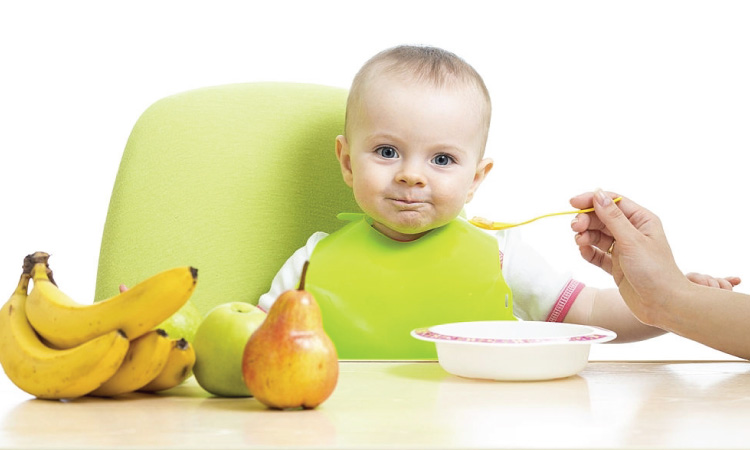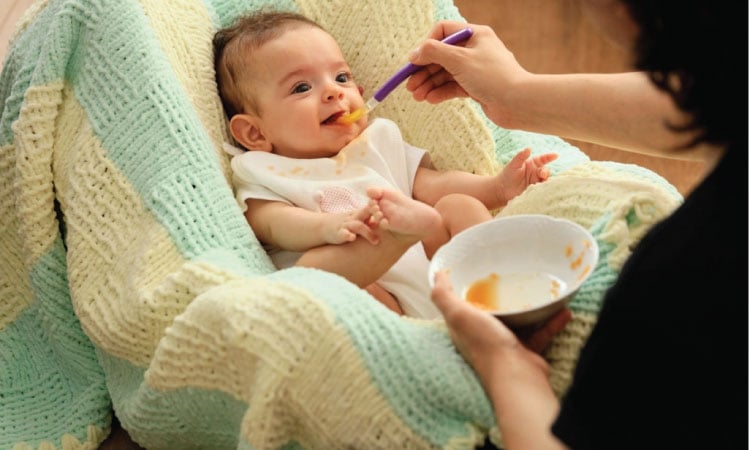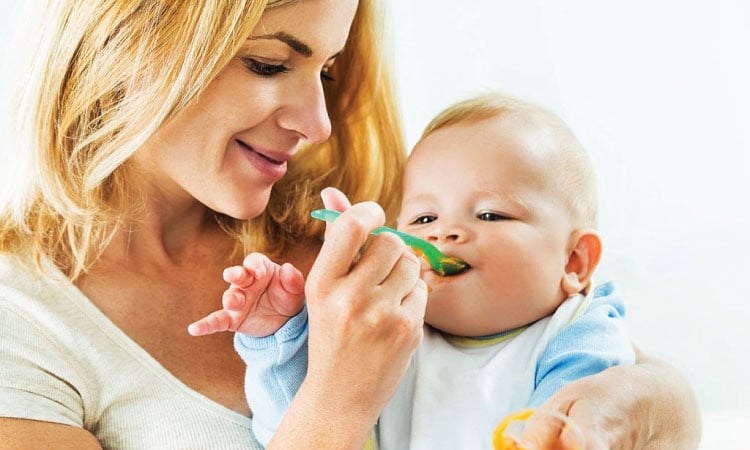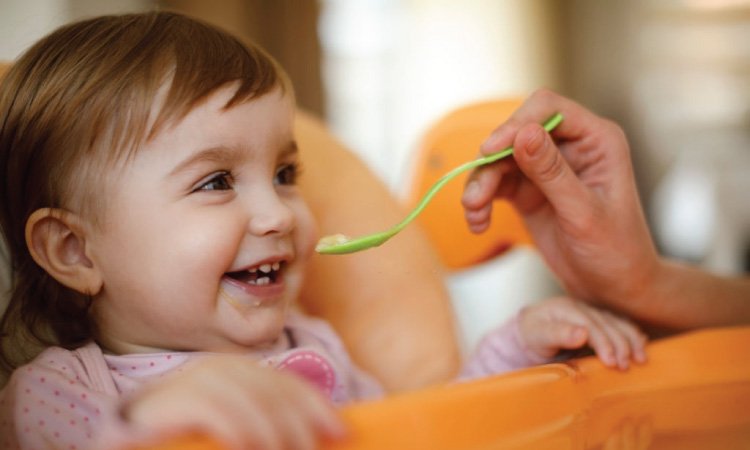Are you planning to start solids for your baby? You must be having loads of questions on baby first foods. It is a milestone, and an important one for that. When it comes to baby first foods, you need to follow a food plan with certain precautions and methods of feeding.
When it comes to starting solids for your little one, there is no watertight rule that you need to follow. It can be anywhere between 4 to 6 months. If the mother has excellent milk supply, exclusive breastfeeding is highly recommended until the baby turns 6 months. It is also dependent on how baby is growing- starting solids is a decision that you should take in consultation with your pediatrician.
If you plan to start baby first foods earlier than 6 months, consult with the doctor first.
The baby will know when they are ready to start eating solid foods and will show you some indication of this. Some signs that you need to give your baby solid food are:
- The baby looks at your plate and seems like they want to try the same food that you eat
- The baby can sit on their own and can control their head well
- The baby’s hunger is not satiated with milk
- The baby opens his mouth for the spoon and no longer has the tongue-thrust reflex
Choose your little one’s first food from these 10 Indian baby first foods for 4 to 6-month-old babies. We also provide some necessary tips which will be useful for first-time mothers.
10 Indian Baby First Foods 4-6 Months
A baby’s first solid foods are a big milestone. Babies usually start eating solid food at around 5 months of age. These foods are generally known as Stage 1 foods. They contain some of the most important nutrients for the baby’s development, while still being tasty.
Remember to prepare as much food for your baby at home, as it can reduce the risk of unhealthy components. Home-made, nutritious food is always the best choice for your little one.
1. Apple puree
Apples make the perfect first food for babies as it carries many advantages. Apple puree is easily digestible and not likely to cause allergies. It is naturally sweet and hence palatable for the little one’s taste buds.
Related Reading: How And When To Use Apple Juice For Baby Constipation (Till 2 Years)
How to prepare apple puree for babies
Wash, peel, remove the seeds and cut a juicy red apple into small pieces. Put these sliced apples into a steamer and steam them until they become soft. Once well steamed, mash the apples to achieve a smooth consistency. You can even sieve to make sure it is free of lumps. Once done, let it be cool. Apple puree is ready for your little one.
Nutritional benefits
Apples are rich in dietary fiber and carry many essential nutrients. It can cure stomach disorders, diarrhea, and constipation in babies.
2. Homemade rice cereal

This is an excellent substitute for Cerelac. This is easy to prepare too. First, let’s prepare the rice cereal powder which can be stored in an air-tight container for 6 months. For this, all you need is half kg of organic brown rice.
- In order to remove the natural arsenic in the rice, you have to soak the rice for 15 to 20 minutes
- After this, rinse the rice well in plenty of water
- Spread it on a big plate and dry it in the sun
- Dry roast the rice in (preferably) an iron Kadai
- Let the rice cool to room temperature
- Grind it to a fine powder and store it in an airtight container
How to prepare home rice cereal for babies
Boil half a cup of water. To this add one tablespoon of homemade rice cereal powder. Stir continuously so that no lumps are formed. One it becomes thick and creamy switch off the stove. Add little breast milk or formula to get the desired consistency. You can add fruit purees, vegetable purees to enhance the taste and increase the nutritional value.
Nutritional benefits
Brown rice is an excellent source of selenium, magnesium, and fiber. Also, it is rich in natural antioxidants. This nutritious baby food will help in gaining the baby’s weight.
This can be made well in advance if you are travelling with the baby and used as and when required.
3. Pureed pear
Pear makes excellent baby first foods next to apple. Like apple, pears are also easily digestible and carry a low risk of allergic reaction.
How to prepare pureed pear
Wash, peel and remove the core of a fresh pear. Slice it and steam it in a steamer until the pear turns soft. Put the steamed pear slices in a blender and mash it until it attains a smooth and creamy texture. You can add some breast milk for formula milk to get just the right consistency and make this puree even more rich in terms of nutrition.
Related Reading: Coconut Milk For Babies – Nutritional Value, Benefits, And Risks
Nutritional benefits
Pear is loaded with potassium, calcium, and magnesium. It is rich in vitamin C. All these elements play an important role in boosting immunity and the growth and development of the baby. Being filled with fiber helps to combat constipation which is quite common when the baby gets introduced to solids.
4. Banana puree for babies

Banana puree is one of the perfect baby first foods. You can give this to the baby either in the 5th or 6th month. Most babies take an instant liking to bananas because of the sweet taste- but do ensure that baby is also introduced to other flavours as well at an early age.
How to prepare banana puree for infants
Peel the ripe banana and cut it into small pieces. Now mash it with a fork or blender. Once pureed it may become brown. No need to worry as it is normal for the banana to change its color once mashed. However, once puree is made, you must feed it to the baby immediately.
You can add a pinch of elachi powder. It not only enhances the taste but also helps with digestion. Also to enhance the creamy texture you can add little breast milk or formula while pureeing banana.
Nutritional benefits
Bananas carry all the benefits of potassium, fiber, and vitamins. It helps the baby with healthy weight gain. Start with quarter of a banana, and gradually, babies can eat one whole banana.
5. Avocado puree for infants
Avocado is an excellent first food for your baby and you can introduce this fruit as early as when the baby is 4 to 6 months old
How to prepare avocado puree for babies
Half a ripe avocado is enough for making this puree. Cut and scoop the contents of the avocado. Mash it well with a fork or blend it well in a blender. Make sure there are no lumps.
Nutritional benefits
Avocado provides key nutrients for the growth and development of the Brain and Central nervous system of the baby. It is also rich in fiber. It also has anti-inflammatory and anti-microbial properties and therefore helps to keep the infections at bay.
Related Reading: When Can Babies Eat Eggs?
6. Pureed sweet potato
Sweet potatoes are easier to introduce to your baby than other vegetables because of their sweet taste. So, pureed sweet potato is a good choice for Stage 1 foods.
How to prepare pureed sweet potatoes for babies
Cut peeled sweet potato into small cubes (about half-inch). Boil water in a pot and add the cubes to it. Reduce the flame to a simmer and cook until the pieces are tender. This will take about 15 minutes. Take these sweet potato cubes and put them in a food processor. Blend until smooth.
If you do not have a food processor, you can also mash it manually, using a fork or other utensil. You can also use milk (breast or formula) to bring the sweet potatoes to an appropriate consistency.
Nutritional benefits
Sweet potatoes are very nutritious. They are rich sources of Vitamin A. They also contain Vitamin C, potassium, fiber, and manganese.
7. Pureed carrots for babies

Often, pureed carrots are one of the first foods babies are introduced to. This is because of its high nutritional value and sweet taste. They are also often mixed with other types of puree.
How to prepare pureed for infants
Thoroughly wash a medium-sized carrot, peel the skin and dice it into small pieces. Steam it until it becomes soft and mash it well with a blender. You can add some warm water / breast milk for formula milk to get the desired consistency.
Nutritional benefits
Carrots are high in beta-carotene. This element turns into vitamin A in the body. Vitamin A is vital for eye health. Likewise, carrot contains vitamin B6, which is necessary for skin, hair, eye, and liver health. Carrot is a good source of fiber as well.
8. Dal soup for young babies
This is counted as one of the best Indian baby first foods for a six-month-old. Dal pani, as it is locally known is one of the most widely used first food for a baby, particularly in India.
How to prepare dal soup for babies
Wash and soak two tablespoons yellow moong dal for 20 minutes. Now in a small cooker pour one glass of water and soaked dal. Add a pinch of turmeric. Close the lid and cook for 2 to 3 whistles. Switch off the stove.
Once the pressure is gone, open the cooker and mash well the content. Now let it pass through a sieve so that all the residues will remain in the sieve. Smooth dal soup is ready.
Related Reading: 12 Best Foods For Baby Brain Development
Nutritional benefits
Dal soup carries vital nutrients and rich in protein. Therefore dal soup help with the growth and development of the baby.
9. Green pea puree

Peas are great green vegetables to introduce to your baby as Stage 1 food. They have a different taste from what the baby is used to but are still delicious.
How to prepare green pea puree for kids
Fill a pan with water and bring it to a boil. Add in the peas and let it simmer. This should take 3-5 minutes. Afterward, drain them and add them to a blender or food processor. You can also add mint. Blend it till it’s smooth. Your puree is ready!
Nutritional benefits
Peas are rich sources of vitamins like Vitamin A, K, and C. It also provides protein.
10. Pumpkin puree
Pumpkin puree is a tasty and nutritious way to introduce your baby to solid foods. It is very helpful for digestion and provides several essential nutrients.
How to prepare pumpkin puree for babies
Carefully peel the pumpkin and get rid of the pulp and seeds. Dice the flesh into small pieces. Steam it. Then, add it into a blender or food processor and blend it until it reaches a nice smooth texture.
Nutritional benefits
Pumpkin is full of several nutrients like Vitamin C, fiber, iron, calcium, and magnesium.
Method Of Feeding Young Babies
You can select any of the above baby first foods. But it is important to follow a good feeding method so that the baby does not get either bored or overwhelmed by the new food choices.
Start with one tablespoon of solid once a day. Continue breastfeeding the rest of the time. Eventually, increase the quantity to two tablespoons twice a day and then shift to three tablespoons twice a day. Follow this rule whenever you introduce new food.
Never mix two new foods together, always wait for 3 days before you introduce another food to the baby. Maintain a food journal so that allergies, if any, can be easily identified and tackled.
Make sure the utensils used to prepare food and feed the baby are very well sterilized. Baby’s immunity is not up to the mark and therefore they are prone to infections and even a small negligence can create health or digestive issues.
Tips For The First Time Mothers

- Stop feeding when the baby refuses to eat. Try a different meal after some time
- Try to introduce different tastes to the baby rather than sticking to one kind of food. Combos of different foods provide more nutrition
- However, there should be a gap of 3 days between the two new foods. This is to find out if the baby develops some kind of intolerance or allergy to the new food
- Patience is the mantra when it comes to introducing new food to the little one. You may win only after 10 to 15 tries
- When we introduce a new food, only one or two spoonfuls are enough for the first try. Even if the baby is eager for more, give them only small amounts. They should still have enough appetite for milk. Do not stop giving the baby milk as soon as they start solids
- Always try to introduce vegetables rather than fruits because of the humans’ inborn preference for sweets
Conclusion
Every baby is different, and preferences will vary from one child to another. If your child seems content with milk and does not seem to want to start solids, you can wait another month or two, until they are 6 months old, to start solids.
Also, ensure that you do not stop giving your little one breast milk or formula milk. The change from milk to solids should be gradual so that the baby can get used to it. So, even if you introduce solid foods, milk should still be the main component of your baby’s diet at least until they are 6 months old.

